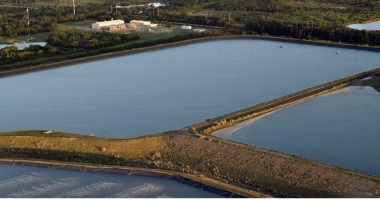Climate, Health and Equity Brief
Melting ice, costly fires and greenwashing
December 14, 2020

Hot Topic: Heating up. Two new reports out this week underscore the unrelenting environmental and economic impacts of global heating as a result of burning fossil fuels. The UN found that global greenhouse gas emissions hit record highs in 2019—levels that set the world on track for an average temperature rise of 3°C this century. The report is a sobering reminder that without a long-term, systemic shift away from fossil fuels, temporary dips in global emissions—such as those that resulted from global COVID-19 restrictions this year—will have little effect in curbing the worst effects of climate change.
A second report found that without major emission reductions, the Arctic could become a region defined more by ocean than ice and snow within 30 years. While emissions heat the entire planet, the light-deflecting ice in the Arctic is rapidly melting and uncovering darker, light-absorbing land and ocean beneath, leading to increased heat in the region—a feedback loop with cascading global impacts.
In economic news, a new study analyzing the impact of California’s 2018 wildfire season found that the damages cost the U.S. economy nearly $149 billion. This year, wildfires in the state have burned more than 4.3 million acres of land, nearly triple the amount in 2018.
In contrast, the economic opportunities of a transition away from fossil fuels are vast. Another major report this week revealed that achieving net-zero emissions in Europe by 2050 would lead to the creation of 11 million new jobs in developing sectors, for a net gain of 5 million jobs after accounting for losses in the fossil fuel industry.
And the shift away from fossil fuels is picking up steam. In the U.S., New York State announced that its $226 billion pension fund would divest from fossil fuel stocks over the next five years. And in Europe, the Danish parliament has voted to end all offshore fossil fuel activity by 2050, opting instead to invest in renewable energy sources like offshore wind.
Meanwhile, the Trump administration continues to rush through more environmental rollbacks in its final days, while Senate Republicans have introduced a bill championing tree planting as a singular solution to climate change. Though trees play a big role in absorbing emissions from the air, the plan relies on trees alone and ignores the urgent need for a systemic change away from the status quo if we are to have any hope of avoiding the worst impacts of climate change for humanity and the planet.
—Matt & Traci, GMMB
Health
A new UN report found that greenhouse gas emissions hit a record high in 2019, putting the world on track for an average temperature rise of 3°C this century despite a dip in emissions caused by COVID-19 in 2020. (Reuters)
A recent report warns that the Arctic is warming at an unprecedented pace that will further exacerbate extreme weather and sea level rise and transform the region into one defined by open ocean rather than ice and snow within 30 years. (The New York Times)
Despite this year’s La Niña weather system, which traditionally causes cooler global average temperatures, scientists forecast that 2020 will be the warmest year on record due to decades of greenhouse gas emissions. (The Washington Post)
Scientists warn that California’s ancient redwoods, which capture more carbon dioxide than any other tree, face unprecedented recovery challenges from this year’s worst-ever wildfire season due to climate-fueled drought conditions. (NPR)
Equity
Mr. Trump’s EPA has refused to set tougher standards on soot, a deadly air pollutant, which experts say will disproportionately harm low-income and minority communities living near highways and industrial activity. (The Washington Post)
A new analysis revealed that despite an overall decrease in arsenic levels in the U.S. water supply between 2006 and 2011, largely unregulated groundwater systems predominantly found in Hispanic neighborhoods and parts of the Southwest had comparatively higher levels of the carcinogen. (Environmental Health News)
Politics & Economy
A new study underscoring the severe economic impacts of climate change revealed that California’s 2018 wildfire season—the state’s second most destructive behind 2020—cost the U.S. economy nearly $149 billion. (Earther)
A coalition of more than 550 organizations is calling on the incoming Biden administration to use executive authority to end plastic production in the U.S. and hold corporate polluters accountable for impacts on communities and marine life. (EcoWatch)
With the inauguration now just 40 days away, the Trump administration is setting its efforts to finalize dozens of last-minute environmental rollbacks into overdrive, including some that could complicate President-elect Biden’s ability to overturn them. (The Washington Post)
Rather than supporting a transition to renewable forms of energy and a substantial reduction in emissions, Senate Republicans have introduced a new bill pushing tree planting as the ultimate climate solution despite clear warnings from scientists that it will not be enough to curb the worst effects of climate change. (The Washington Post)
A new report revealed that achieving carbon neutrality by 2050 in Europe will create an estimated 11 million new jobs in developing sectors, resulting in a net gain of 5 million jobs after accounting for losses from the fossil fuel industry. (Euractiv)
Action
New York State has announced that its pension fund, which currently holds $226 billion in assets, will divest from fossil fuel stocks over the next five years and sell its shares in companies that contribute to climate change by 2040. (The New York Times)
The Danish Parliament has voted to end all offshore oil and gas extraction activities by 2050 in favor of a transition to wind-generated electricity and other renewable energy sources. (AP News)
Kicker
Looking for some new entertainment? Check out EcoTok, a collective of climate-concerned TikTokers looking to inspire environmental action.

)





